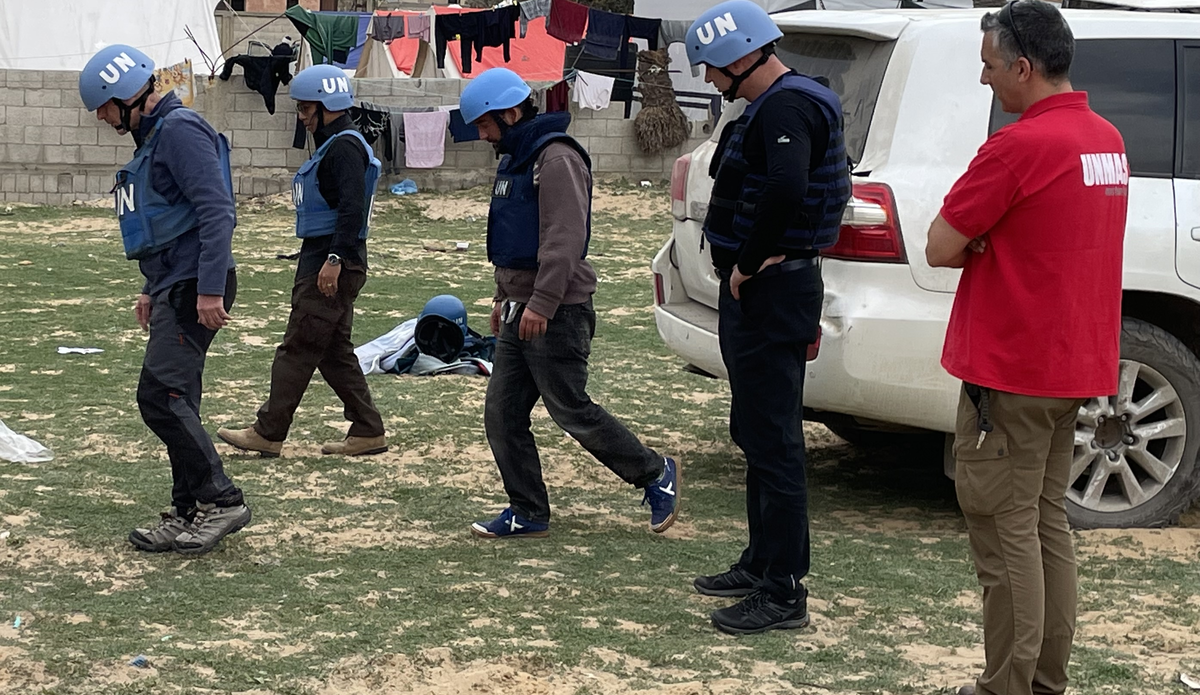JOINT PRESS RELEASE
United Nations Mine Action Service (UNMAS)
Representative Office of Japan to the Palestinian Authority Ramallah, State of Palestine
28 March, 2024
JAPAN SUPPORTS UNMAS HUMANITARIAN
MINE ACTION PROJECT TO REDUCE EXPLOSIVE RISK FACED BY CIVILIANS
Palestine (28 March 2024): The Government of Japan has contributed US $1,258,861 to the United Nations Mine Action Service (UNMAS), for the project “Humanitarian Mine Action to Reduce Explosive Risk Faced by Civilians''. The funding from the Government of Japan will support UNMAS to deliver explosive ordnance risk education (EORE) and conduct explosive ordnance disposal (EOD) response in the Gaza Strip, responding to the conflict that started on 7 October. The project will mitigate the threat of explosive ordnance for the vulnerable populations in Gaza and enable safe delivery of emergency humanitarian assistance.
The ongoing conflict witnesses the use of thousands of tons of explosive munitions in Gaza through air, sea, and land strikes, which are anticipated to leave an amount of explosive remnants of war (ERW) that is unprecedented for the Gaza Strip.
According to the Ministry of Health in Gaza as of 21 March, at least 31, 988 Palestinians have been killed in Gaza and 74,188 have been injured since the start of the conflict. In addition, it is estimated that more than 70,000 housing units across the Gaza Strip have been destroyed or rendered uninhabitable and over 290,000 housing units have been damaged. This exacerbates the effects of the repeated rounds of escalations since 2008, which resulted in the death of 6,297 individuals and injury to 148,348 people as well as total or partial destruction of over 80,000 housing units.
The ERW contamination poses an immediate risk to lives, hinders the delivery of humanitarian aid, restricts safe movement, and impedes recovery and development initiatives. This is an especially serious issue in the Gaza Strip as there are significant needs for humanitarian assistance, including rubble removal, reconstruction, food, water, and health, for almost the entire population, with over 1.7 million people, or nearly 75 per cent of the population, estimated to be internally displaced. Once a ceasefire is reached, the expected increase in movements of people who return home, try to rebuild their lives, try to access agriculture, livelihood and other resources as well as basic social services, plus the increase of humanitarian response activities for emergency, recovery and development support, will expose vulnerable populations as well as the UN and humanitarian partners to the life-threatening risks due to ERW contamination. It is of utmost importance that humanitarian and civilian locations and routes are clear of ERW, as well as that civilians and humanitarian personnel are equipped with the knowledge of safe behaviour when faced with suspected ERW, to mitigate the risk of death and injury. The contribution from Japan will support UNMAS in delivering the mine action intervention to enable critical humanitarian assistance in Gaza during the conflict, and after a ceasefire.
Mr. Yoichi Nakashima, Japan’s Ambassador for the Palestinian Affairs stated, “The project is extremely important not only for the direct benefit of the population in Gaza, but also for ensuring the safety of those engaged in humanitarian relief operations amidst the current conflict.”
Mr. Charles Birch, the Chief of the Mine Action Programme of UNMAS in Palestine said, “UNMAS Palestine would like to thank the People of Japan for their generous support which allows UNMAS to continue its life saving work.”
The Government of Japan has supported the humanitarian mine action in Gaza over the years, which has enabled UNMAS to mitigate the threats of ERW in Gaza. The renewed support at this critical time is particularly valuable.
For more information contact:
Mr. Charles Birch, Chief, Mine Action Programme, UNMAS Palestine, charles.birch@un.org
Ms. Tomoko Nakayama, Programme Management Officer, UNMAS Palestine, tomokona@unops.org

